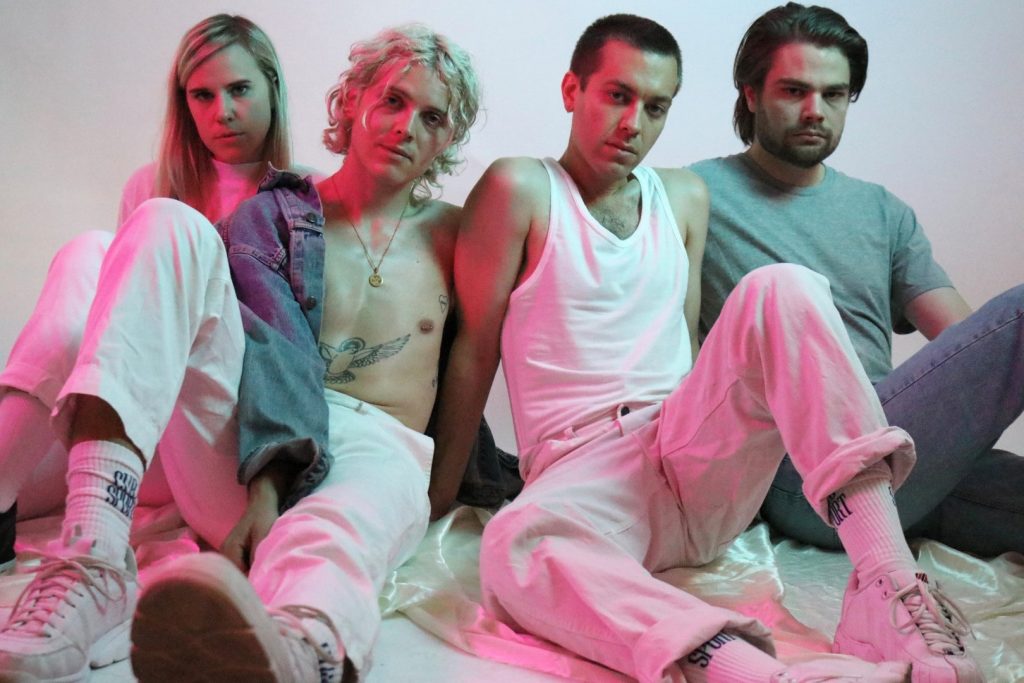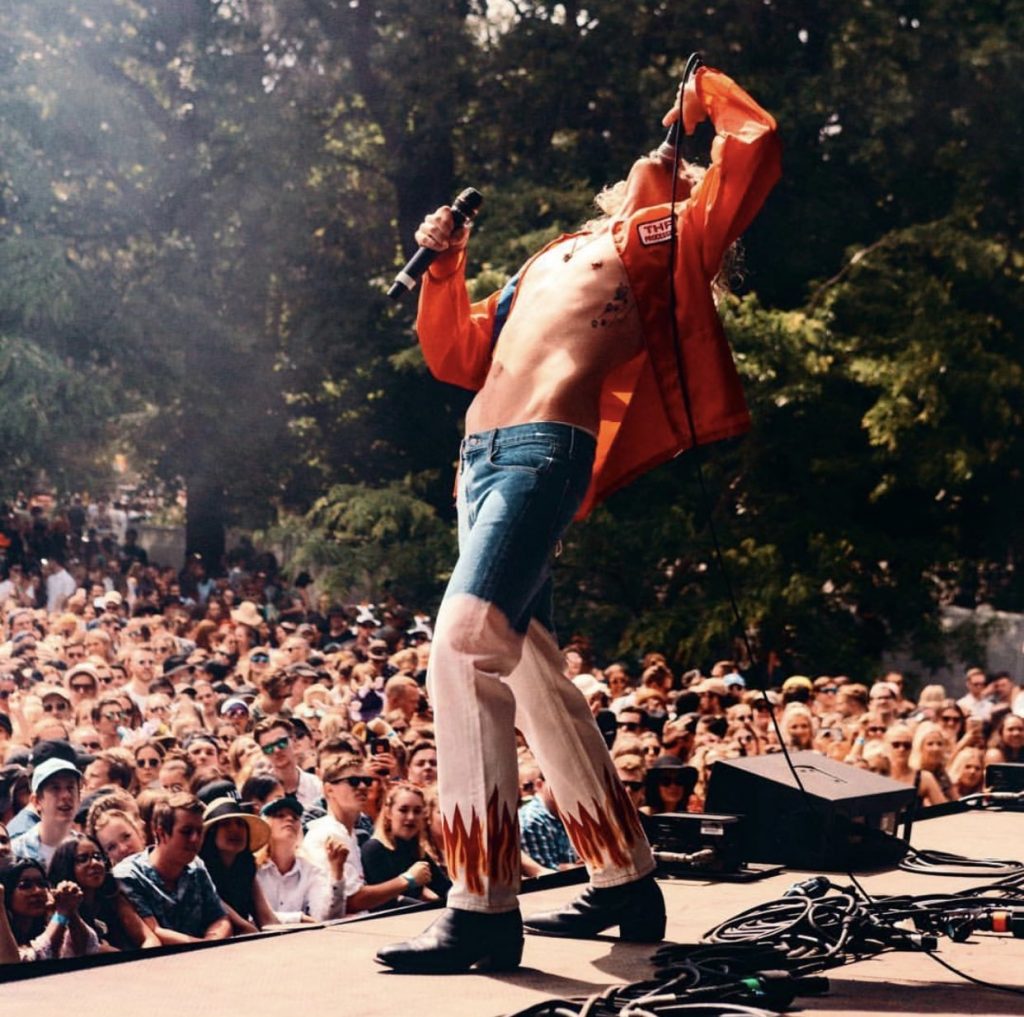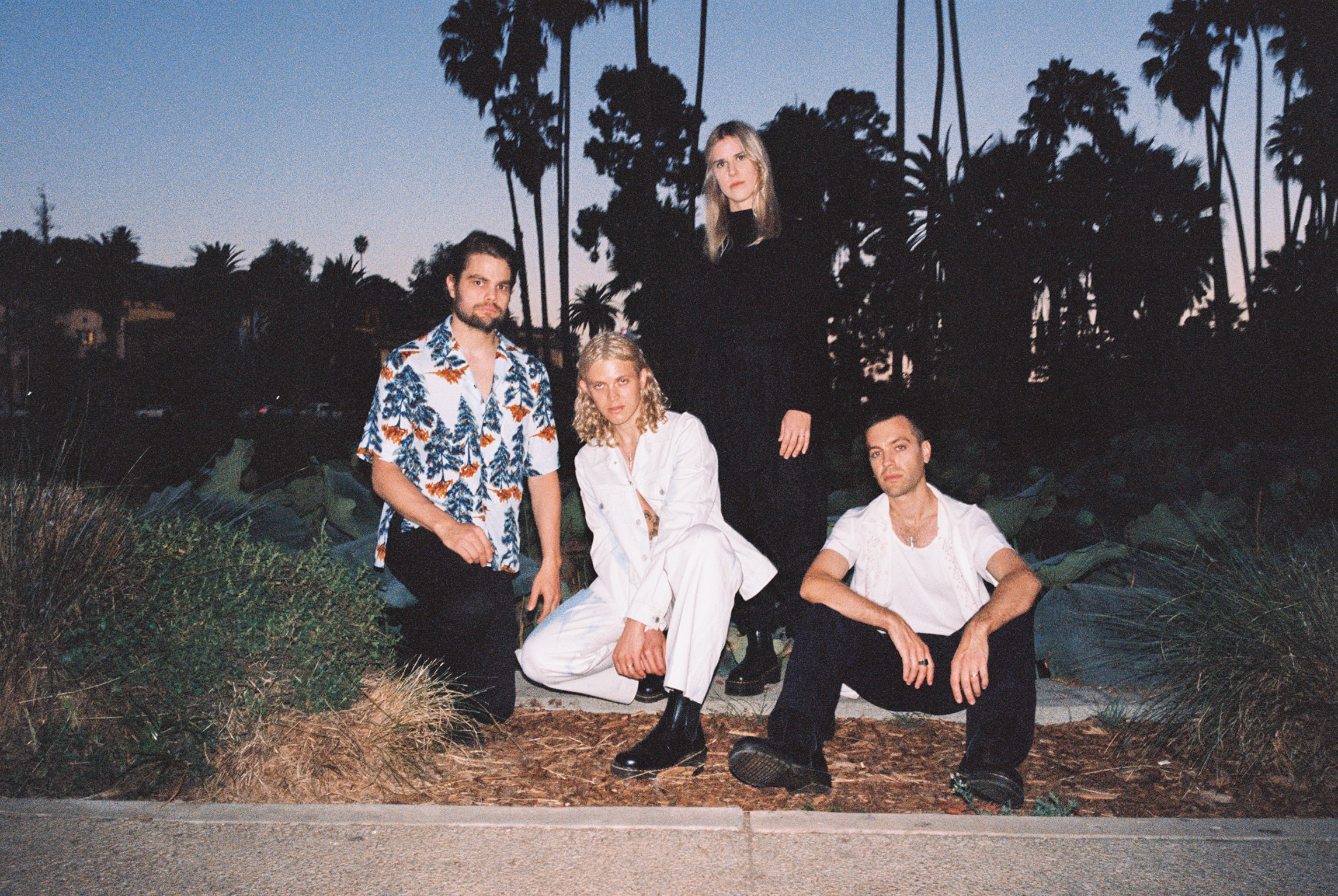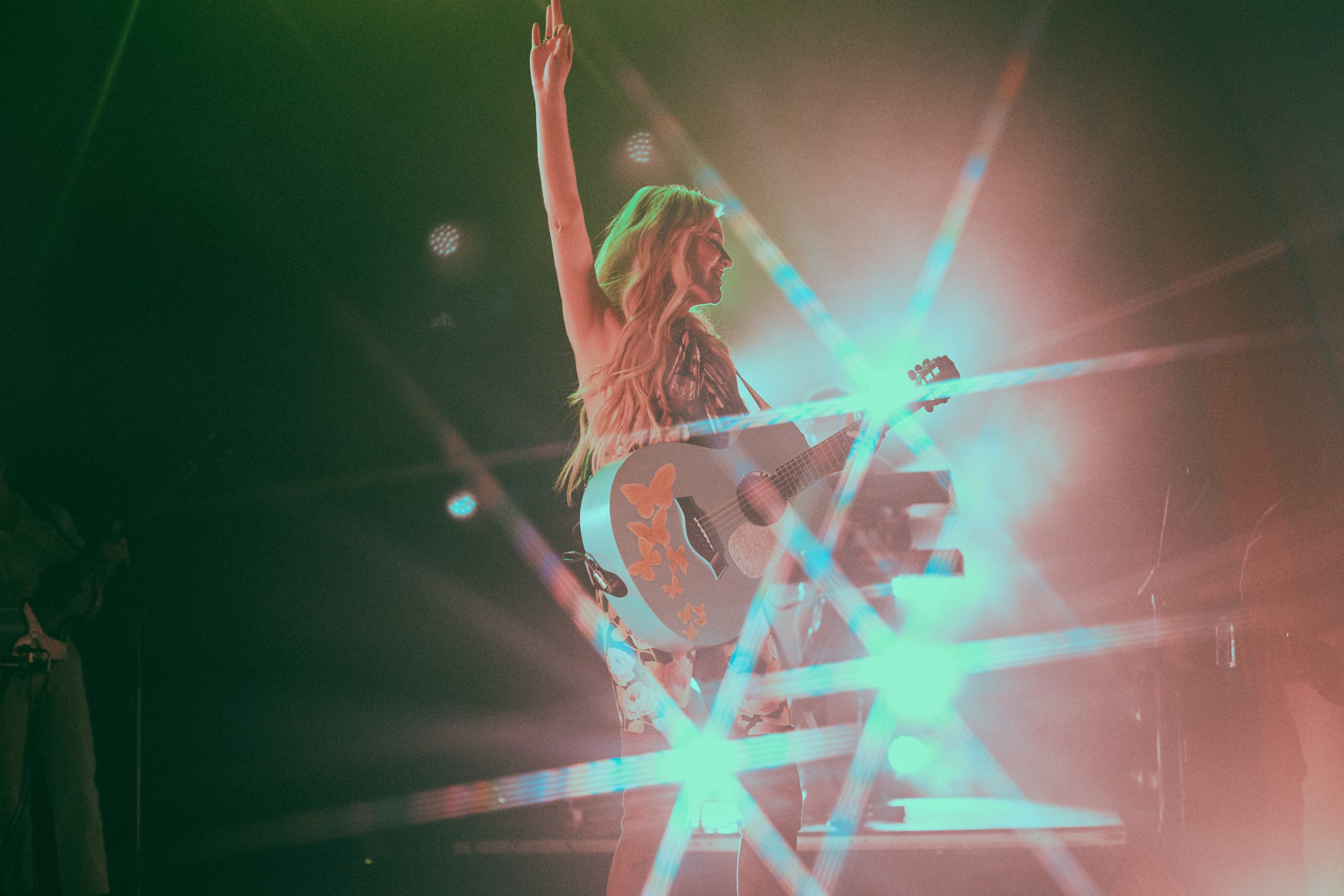Cub Sport is a “transdimensional genre queer pop” band – yeah we’ll get to that – from Brisbane. Nick spoke to Tim Nelson, the enigmatic and colourful lead singer of the group, about the release of ‘Cub Sport’, Billie Eilish listening to their cover of ‘When The Party’s Over’ and his never-ending search for identity.
N: Can you tell me about what it was like growing up in Brisbane?
T: I love the place, I love the weather here and there’s a general good vibe, it feels pretty relaxed which is something I learned to appreciate once I’d got a bit older and travelled. I always liked Brisbane growing up, but I think it really took going to a bunch of other places to realise how special it really is.
N: What is it like coming home now?
T: There’s always a short period that’s kind of like whiplash, it’s just a completely different pace, going from being in a different city every day and changing time zones constantly, to putting your clothes in the cupboard and staying in one place – there’s always a day or two where you feel weird. Then you kind of slip back into it.
N: How did you get into recording?
T: I started doing piano lessons when I was six or seven, my mum used to play the piano and I loved listening to her play. My piano teacher ran little competitions for original piano compositions and that sort of thing, that got me into it, that was the first time that I created music myself when I was 8 – I have no idea what I was like haha. And then, when I got into high school I started writing lyrics and singing, and that’s when I started writing songs.

N: How did you pluck up the courage to start performing in front of others?
T: My best friend in high school was a singer, and I always played the piano while he sang. Then, there was a talent quest that the school put on and the prize was tickets to a theme park or something and we really wanted them, so we did a simple plan cover. At one of the practises I started singing part of it and he was like “maybe you should actually sing to this,” and then that’s when I first sang in front of people. We won the talent quest, I was like I want to sing in front of people all the time now.
N: When you started writing – and perhaps now more than ever – did you find that the place, the atmosphere, your surroundings mattered to you as a songwriter?
T: Yeah, I think different places have different energies. The things I experience in your day to day life really do impact what I end up creating. Whether I am conscious of it or not, I feel like wherever I am definitely influenced what comes out. Sometimes I feel like that can be really obvious, it makes more sense than other times.

N: Can that be something that hinders the process?
T: Yeah for sure, I’m a believer that things happen when they happen for a reason. I feel like writing songs and creating art is the same as that – inspiration comes when it comes for a reason. Sometimes I feel like when I try and write a song, and it feels like I can’t come up with something good, I’m just not meant to be creating something or there’s something I need to experience first to put into it.
N: Do you step back from your writing and think “this isn’t going anywhere, I’ll come back to it” then? How do you finish off the process?
T: I feel like now, as we’ve become busier and we’re playing more shows, it feels like every moment is more valuable for me. So, if I have the time to be creating and it isn’t exciting to me, or I’m not feeling inspired, then I’m often like I’m going to leave this and start again with something else – and I’ll kind of do that until I feel excited about a song. For me now, I have to be excited about it along the way for it to get there.
N: Would you say that excitement is what keeps you writing?
T: I’d say it’s one of the things, I think it’s a combination of a few things. Writing songs has always been a way for me to figure out how I’m feeling. Sometimes it’s those spontaneous moments where I’ll be singing along and lyrics come out that I haven’t really thought about. Sometimes they’re about the present moment, sometimes they’re for the past and sometimes they’re about the future – something that I will work out further down the line. I feel like it’s almost become a way for me to connect with myself.
There’s also an element that when I create something that I love, and I can’t stop listening to it, like the day before that song didn’t exist and now I’m listening to it.
N: Do your songs surprise you in that respect?
T: Yeah, the funny thing with my writing is that my subconscious comes through, I’m more honest or more connected when I’m writing songs than when I’m thinking rationally or having conversations. They’ll be times when I look back at songs that I wrote years ago and I can fully grasp the meaning of the lyrics. With the hindsight of life experience, I can see what my younger self was saying which is really interesting.
N: That’s interesting for you because obviously, you came out, and looking back at those songs will mean something very different to what we see. It’ll be a very personal thing.
T: Yeah, looking at the songs I wrote before coming out, I can identify so many themes and hints in the lyrics about what I was going through with my battle with my identity and sexuality. At the time, I had all these other ideas of what I thought I was singing about, but now it’s so clear to me what was actually coming out.
N: Does music still offer you a way of exploring your identity?
T: Yea, I feel like It does. It’s like those songs where the lyrics don’t make total sense to me as I am writing them, but you get a feeling that it is what it’s meant to be. I think as I have become more open – and a lot of it has been through doing interviews and been forced to identify what the songs are about for the sake of having to talk about them – has made me reveal parts of myself that I hadn’t seen before. It feels like as I get more open, I am drawn deeper and deeper into creating something that I don’t understand in the moment.
N: I assume people dislike interviews. But if it was turned around to me, in the best conversations of my life I’ve learnt about myself. How do you feel about interviews?
T: I think it’s a huge honour to be able to create songs as what I do with my life, and when somebody wants to invest their time into asking me about it or reading about it, that’s a huge honour. It can be hard sometimes to talk about them because it’s a process. Writing a song and recording it, there’s the first part of acknowledging it to yourself, and then there’s sharing it. It can be intimidating at times knowing that anybody can find out deeply personal stuff about you, especially its stuff about people you know. That can be hard. But, I just have to remember that sharing these experiences and being open about what inspires my music helps people who are in a similar situation to me when I was younger – that makes me realise I should do this.
N: Do you find it difficult to lay yourself bare artistically in your interviews and music?
T: I feel like coming out helped me a lot [in this respect] because I felt like I knocked down a big wall. And after I’d knocked down that first big wall, I began to identify other things that I felt were stopping me from being my truest self.
T: I think going from being in a place in myself where I always felt like I was hiding something – because I was pretending to be straight when I wasn’t – to being honest about everything, it was a big change. It’s been a really great thing that’s changed me a lot, seeing it being well-received really builds my confidence.
N: I think a lot of people recognised the difference in the honesty in your last record, not just in your appearance and how you hold yourself, but the music itself was excellent in that respect. What do you enjoy about covering a song?
T: We only cover songs that we really love, it’s cool to be able to be the one to perform the song you love.
N: I think it’s a great way to respect the artist. I saw that Billie Eilish listened to your cover on Triple J and liked it, how did that make you feel?
T: It was kind of mind-blowing. It’s bizarre to know she’s heard us singing and playing her song, she doesn’t give a whole lot away in interviews but she was smiling which was nice.
N: Are listening, performing and creating separate things to you?
T: Yeah they’re kind of different things. I do like listening to another artist that makes you really feel something, that’s a really special experience. I feel like there are certain albums I really connect with, and when I find those albums that is a really amazing thing. Otherwise, I’m mainly working on my own music, but I guess I do see them as two separate things. Though, there’s something similar about the way I enjoy consuming other peoples music and creating my own, there’s a certain feeling.
N: What’s the story behind Cub Sport Records by the way?
T: Around the time we were getting ready to release our second album Bats, we strongly felt like we needed to have total control over the way that things were released, the teams that we were working with, the way that all the teams communicated and the messages that were going out from everyone who was working on the record. So, we decided to become self-managed and independent, and release the album through our own label. We wanted to get it out quickly and we ended up scrambling and pulling together an international team – it was kind of a miracle the way the dream team came together. It was a much more successful release than we’d experience before, and it was so amazing to be at the centre of the team working on it.
[Bats] was the album that I was writing when I came out, so it marked a big transition pre and post that, and getting together with Bolan, it was the first time I’d written so blatantly personal before. It was kind of just a gut feeling that we had to follow.
T: We picked the singles and when everything is released. We were able to follow our gut instinct, and do things that might not necessarily make sense in the moment, but they just felt right. Later on, you can look back and see why things worked out the way they did. I think it feels like an important part of how Cub Sport works now.
N: What else captivates you as an artist? Film, paintings, poetry etc?
T: I do love Leonard Cohen, I’d class him as a poet even though he’s a musician as well. And, I always feel really inspired when I read his lyrics and poetry. It was reading his lyrics, that’s definitely something that I’ve found inspiring over the years. Especially in ‘Chelsea Hotel No.2’, I used to listen to his lyrics and think “I can’t believe the freedom he had to say whatever he wanted”. That was before I had come out, and I was like just imagine if I could be myself to that extent in my writing. That’s something that was hugely inspiring then and it’s stuck with me.
I also find life in general and connecting with different places and people and animals, everything inspiring. Over the last couple of years I feel like I’ve opened up a lot, and I can just feel more connected to myself and more connected to everything around me – that has shifted my perspective in a lot of ways. That kind of different take on my existence has been pretty inspiring.
N: If you explore your identity things tend to change in their meaning to you, like clothes, for example. You have a strong style, and you can see that change in your identity symbolically in what you wear. Aesthetically you have a stronger character now more than ever, how important are clothes to you as an artist?
T: Clothes are a weird thing, like we all wear different clothes and different people like how they feel in different clothes. But it is a very effective way to present to the outside world what you’re feeling on the inside, and what makes you feel comfortable and at your best. I feel like that’s something that drives our developing style and aesthetic, and the way that it’s changed over time.
Change for us comes from feeling more comfortable and sure of who we are. And, I guess it’s about feeling inspired to be confident and present that to the world. I feel like if you see someone really being themselves, fearlessly presenting who they are to the world, it gives you permission to do the same. It makes you feel safer and supported to explore more of that yourself. That’s something I hope has a ripple effect onto our fans and anyone who comes into contact with us.

N: Is it something that you get inspired by others to pursue, style, or is it something that comes naturally as you change?
T: I feel like it’s kind of something that comes to me when I change. Like there’s the different places that I go to, and the different access I get to things to wear. I definitely screenshot styles that I like, and I’ve got mood boards through my photo roll – that’s part of what inspires me. But, a lot of it is trying stuff and feeling what’s right.
N: You’ve worn some great outfits, most recently the neo-futuristic cowboy look, sportswear and so on. What looks have you got in your sights for the future? Another sci-fi look?
T: I’d be down for exploring some sci-fi. It’s kind of just the new things that I come across and that I have the opportunity to try out. We just went and got some new options to wear for this next run of shows. I’ve got a couple of combinations of things that I’ll try out, but I guess I’ll just vibe it out. I never really have much of a plan but just vibe it out.
N: So you don’t have an outfit to tour with?
T: I do sometimes, and I usually have a couple of options, like I’ll get something just before a tour. But, one thing usually ends up feeling the best and then that’s the thing that I’ll wear for a run of shows.
N: Is it almost like a uniform do you think?
T: Yea, it is kind of, it’s funny when you get in a routine with it. Last US tour I was wearing a bunch of black harnesses and chains and stuff, we’d have a whole routine of doing our warm-ups backstage with our Manuka honey drinks before getting into our ‘same look’ that we wear every night. It kind of gets you in the zone I think.
N: I know a lot of people focused on you coming out as the main theme in the last album, but how do you think you will change looking forward without that event focused on your work?
T: I feel like it’s going to be something that will always be relevant to our story. I don’t feel like it’s a central theme or anything.
I feel like for the next album I hope that it isn’t as much about the fact I’m gay, it’s become a much more normal part of my day to day life. I feel like it isn’t as present a theme of my life that I’m working through. I do feel like there are parts of it that are a gradual thing, like moving past residual internalized homophobia and the need to feel validated as a man. But, I feel like most of it is just about feeling good and trying to zone in on those moments of feeling really happy and light for the first time in kind of forever. I’m sure there are ways of tying that back into the whole journey, but a stand-alone thing that I hope is something people can relate to outside of sexuality.
N: You labelled your music on Instagram as “transdimensional genre queer pop”, could you tell us about what that means?
T: I wrote that to try and describe the way that I feel it exists. I feel like it isn’t really bound by genre. I feel like a lot of my best work comes from when I feel a pure form of inspiration, and that comes from my higher self sometimes. It feels like I’m just the one who’s putting this particular message or sound that’s from somewhere else into my recording session – that’s where the ‘interdimensional’ bit comes from. It was meant to be funny but I very much feel like that is the way to describe it.
N: Quite a few people have said the exact same thing to me in the past, like it’s beamed into them from another universe or something. Out of interest, do you ever disagree with labels?
T: I’m kind of in two minds about it. I would love for it to not come off that being gay is like a crutch, something to rely on to make us worth speaking about. But, at the same time, especially before I came out, it was always a little bit of a nudge when I would see something about someone who was gay. I love to support and engage with the Queer community. I wear the label proudly because I can now. I couldn’t always be in the place to do that. At the same time, I hope that people are excited about Cub Sport not just because we’re gay.
Listen to Cub Sport on Spotify and Apple Music. Get the latest edition of our print magazine featuring Black Honey, Matt Maltese, Mattiel and more HERE.


